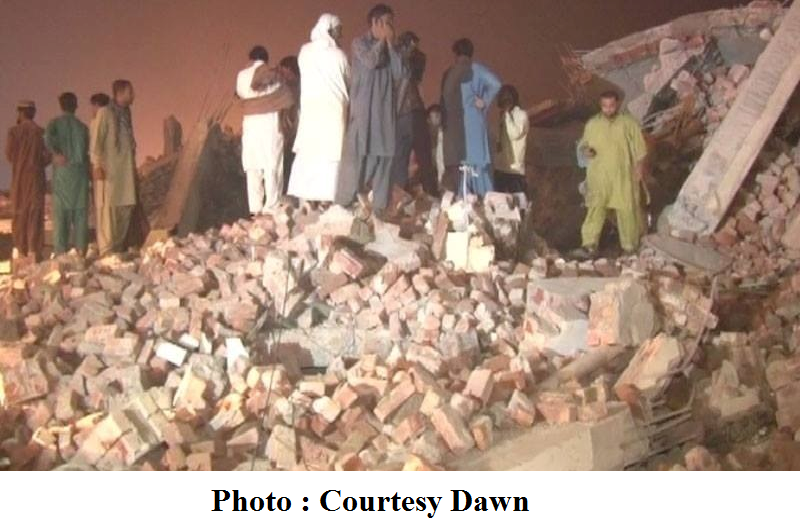
The granting of the General System of Preference (GSP+) status to Pakistan, applicable from 1 January 2014, has done little to improve the condition of labourers in Pakistan, while industrialists continue to disregard minimum wage rule and industrial safety standards. The history of industrial accidents in the country is rife with examples of preventable accidents. Sadly, another industrial accident occurred on 4 November 2015, when a four storey plastic bag manufacturing factory at the Sundar Industrial Estate near Lahore in Punjab Province collapsed, killing 40 workers and injuring dozens; 33 others are reported missing.
Injured survivors have said the factory owner, who was adding a new floor to the building, ignored advice from his contractor, and pleas from his workers, to stop construction, after cracks in the walls appeared, following a powerful earthquake last week, which killed 400 people.
No part of the four-storey building has remained standing after the collapse, and hundreds of rescue workers have been carefully picking through piles of concrete and bricks to locate survivors.
Media reports quote one of the survivors who witnessed cracks first appearing in the structure moments before the collapse:
“Suddenly, I saw cracks appearing in the pillars. I immediately drew the owner’s attention towards the cracks. He was watching them when the roof collapsed and I saw him being crushed by a heap of concrete that led to his death.”
Most of the workers employed at the factory are aged between 14 and 25; there have also been reports stating children as young as 12 had been working in the factory, in violation of the Employment of Children Act, 1991. According to reports on social media, some of the workers working in the factory were being paid a daily wage of only Rupees 200, i.e. well below the minimum wage.
Managed by the Punjab Industrial Estates Development and Management Company, the Sundar Industrial Estate had reportedly attracted investment to the tune of Rs. 40 Billion between 2009 and December 2014. The industrial area soon became over populated, with factories being erected without any regard to quality of structure, which has resulted in the 4 November incident.
Pakistan’s construction sector suffers from poor oversight and developers frequently flout building codes. Factory owners also generally avoid investment in fire extinguishing equipment in order to save costs, at the expense of the lives of workers.
In 2012, two industrial accidents simultaneously occurred in two of the largest cities of Pakistan. These took place on 11 September 2012, claiming the lives of 284 poor workers.
One took place in Baldia Town Karachi at the Ali Enterprises Factory. Due to the factory catching fire, 259 workers, including women and youth died, trapped inside the locked premises. This remains the worst industrial disaster in history of Pakistan. On the very same day a factory fire killed 25 workers inside a shoemaking factory, located at Gulshan-e-Ravi area in Lahore. The Lahore factory caught fire when sparks from a faulty electricity generator had flown into a pile of chemicals stored in the vicinity of the unit.
Industrial working conditions in Punjab have deteriorated ever since the abolition of labour inspection around seven years ago. Inspection was stopped following an executive order issued under the provision of the Punjab Industrial Policy, 2003, which aimed at “developing an industry and business friendly environment” to attract fresh investment.
The abolition of labour inspection is a violation of the Constitution and Federal labour laws and amounts to infringement of the fundamental rights of industrial workers. It is also a violation of the International Labour Organization’s C-81 labour inspection convention that provides for labour inspection for effective implementation of labour laws.
Criminal negligence of government departments in implementing building laws is a matter of grave concern. According to experts, industrial accidents are always preventable; this is a basic theme of any health, safety and environment (HSE) program. Accidents occur when industrial safety is compromised in the design, procedures, processes, or due to human behaviour. Prevention of industrial accidents requires active participation of the three most important stakeholders in the industrial development of any country, i.e. the state, the industrialist, and the trade union. Each must play their part to ensure that the chances of accidents are minimized.
The AHRC urges government to enforce a robust regulatory mechanism where factory owners are forced to abide by employee health and safety regulations.